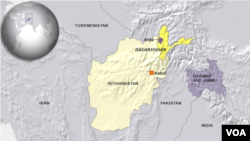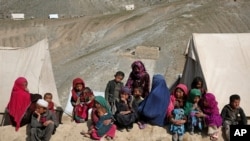ISLAMABAD, PAKISTAN —
Aid workers in northern Afghanistan are distributing food and tents to the survivors of a massive landslide that buried the village of Ab Barek. Government officials say anywhere between 250 and 2,000 people were killed in the disaster.
The village of Ab Barek, obliterated Friday by a giant landslide, has become a mass grave. With little hope of finding anyone living under the tons of mud and debris, Afghan government and international aid groups now are focusing on the living.
“[It is] like when you are walking on the beach and your footsteps simply disappear behind you: There is nothing to be seen. There is not even stone on stone, there is just one big, flat sloping field of mud which is lying there,” EU Ambassador Franz-Michael Melbin told VOA after visiting the scene.
About 300 houses were buried under Friday’s giant landslide followed heavy rains in northern Badakhshan province. Officials say it is one of the country's deadliest natural disasters.
World Food Program spokesman Wahedullah Amani said there is no hope of finding survivors.
“The rescue operation is stopped. Since there was lots of mud, like up to 100 meters and it was impossible with this local equipment, and what we heard is that there is no hope for everybody to be alive,” said Amani.
He said despite challenging local conditions, aid has been rushed to the area.
"The good thing is that everybody arrived to the area and they are ready to help. I think more than enough food ... has arrived to the area, and it is being distributed.”
EU Ambassador Melbin said due to the nature of the disaster, which wiped out families without a trace, long-term support will be essential.
“They will need, especially the vulnerable victims, the orphans, of which there are many, and widows, of which there are also many, will need some kind of social psychological support and also some kind of long, good term economic support to re-establish their lives and get along in a society, which traditionally can be very difficult to be a widow and an orphan,” said Melbin.
U.N. Secretary General Ban Ki-moon and other international officials have expressed their sympathy to those who lost their homes and families.
The village of Ab Barek, obliterated Friday by a giant landslide, has become a mass grave. With little hope of finding anyone living under the tons of mud and debris, Afghan government and international aid groups now are focusing on the living.
“[It is] like when you are walking on the beach and your footsteps simply disappear behind you: There is nothing to be seen. There is not even stone on stone, there is just one big, flat sloping field of mud which is lying there,” EU Ambassador Franz-Michael Melbin told VOA after visiting the scene.
About 300 houses were buried under Friday’s giant landslide followed heavy rains in northern Badakhshan province. Officials say it is one of the country's deadliest natural disasters.
World Food Program spokesman Wahedullah Amani said there is no hope of finding survivors.
“The rescue operation is stopped. Since there was lots of mud, like up to 100 meters and it was impossible with this local equipment, and what we heard is that there is no hope for everybody to be alive,” said Amani.
He said despite challenging local conditions, aid has been rushed to the area.
"The good thing is that everybody arrived to the area and they are ready to help. I think more than enough food ... has arrived to the area, and it is being distributed.”
EU Ambassador Melbin said due to the nature of the disaster, which wiped out families without a trace, long-term support will be essential.
“They will need, especially the vulnerable victims, the orphans, of which there are many, and widows, of which there are also many, will need some kind of social psychological support and also some kind of long, good term economic support to re-establish their lives and get along in a society, which traditionally can be very difficult to be a widow and an orphan,” said Melbin.
U.N. Secretary General Ban Ki-moon and other international officials have expressed their sympathy to those who lost their homes and families.












